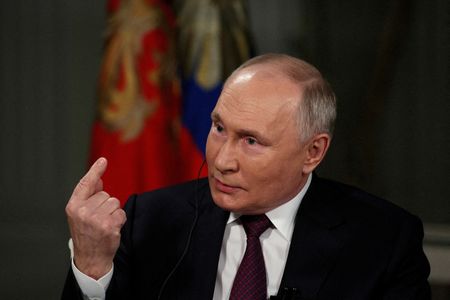(Reuters) – The Kremlin said on Friday that what it has described for more than two years as its “special military operation” in Ukraine had “become a war” because of the involvement of the West.
Here is a look at why Russia is changing its terminology.
IT WAS ALWAYS A WAR, SO WHY CALL IT A ‘SPECIAL OPERATION’?
President Vladimir Putin coined the term “special military operation” – the Russian initials are SVO – on Feb. 24, 2022, the day he launched his full-scale invasion of Ukraine. By using that euphemism, he created expectations for an action that would be limited in time and scale and wouldn’t impinge on most Russians’ normal lives. He also shut down criticism of the invasion and made it a crime to describe the war as a war by signing laws that set long prison terms for “discrediting” the armed forces or spread “false information” about them.
WHAT’S CHANGED IN RUSSIA’S LANGUAGE OVER TIME?
The notion that Russia is not fighting an actual war has become impossible to sustain, given the scale of casualties, the huge increase in defence spending and military production, and the frequency of Ukrainian strikes not only in border areas but deep into Russian territory. Putin has continued to refer to the SVO but has increasingly portrayed the conflict to Russians as an existential struggle akin to that waged by the Soviet Union against Nazi Germany in World War Two. He has accused the West of using Ukraine as a theatre to wage war against Russia by supplying it with weapons, money and intelligence.
SO WHAT IS THE KREMLIN SAYING NOW?
Putin’s spokesman, Dmitry Peskov, said the SVO had become a war when the West joined on Ukraine’s side. He said everyone needed to understand this for the sake of their “internal mobilisation” – a phrase that suggests the Kremlin is demanding a shift in the national mindset to rally the entire country behind the war effort.
WHY NOW, AND WHAT COMES NEXT?
The shift in language follows five days after Putin won a new six-year term in a presidential election from which two candidates who opposed the war were barred. Russia is also now speaking increasingly about the need to seize more Ukrainian land – Putin said this week it may need to create a buffer zone to protect its own territory from attack, and Peskov said Russia must fully “liberate” the four regions of Ukraine that it has claimed as its own but only partly controls. The shift in their language suggests that Putin, encouraged by Russian advances in the past few weeks and delays in the supply of new U.S. aid to Ukraine, has now turned the war into the defining mission of his rule. A key question in the coming months will be whether Putin decides, in addition to the “internal mobilisation” that Peskov called for, to stage an actual mobilisation like the one he ordered in 2022, when 300,000 extra reservists were called up to fight.
(Reporting by Mark Trevelyan, Editing by Timothy Heritage)
